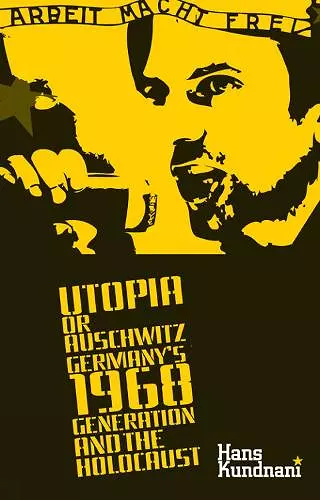Utopia or Auschwitz
Germany's 1968 Generation and the Holocaust
Format:Paperback
Publisher:C Hurst & Co Publishers Ltd
Published:1st Sep '09
Should be back in stock very soon

One thing above all separated the radical students who demonstrated on the streets of West Berlin and Frankfurt in 1968 from their counterparts in Berkeley or New York. In the US, the baby boomers grew up in the shadow of what Tom Brokaw called the greatest generation. In its place, Germany had the so-called Auschwitz generation. What became known in Germany as the '68 generation' or just the Achtundsechziger had grown up knowing that their mothers and fathers were directly or indirectly responsible for Nazism and in particular for the Holocaust. Germany's 1968 generation did not merely dream of a better world as some of their contemporaries in other countries did; they felt compelled to act to save Germany from itself. It was an all-or-nothing choice: Utopia or Auschwitz. Kundnani shows that the struggle of Germany's '68 generation also had a darker side. Although the 'Achtundsechziger' imagined their struggle against capitalism in West Germany as 'resistance' against Nazism, they also had a tendency to see Auschwitz everywhere and, by using images and metaphors connected with Nazism to describe events in other parts of the world, they relativized Nazism and in particular the Holocaust. Even more disturbingly, despite the anti-fascist rhetoric of the 'Achtundsechziger', there were also anti-Semitic and nationalist currents in the West German New Left that grew out of the student movement. "Utopia or Auschwitz" traces the political journey of Germany's post-war generation and examines the influence that its ambivalent attitude to the Nazi past had on the foreign policy of the 'red-green' government between 1998 and 2005, which included several former members of the student movement like Joschka Fischer. The red-green government's schizophrenic foreign policy, manifested its response to the crises in Kosovo, Afghanistan and Iraq, reflected the 1968 generation's ambivalent attitude to the Nazi past.
'Utopia or Auschwitz is an enlightening read for anyone interested not just in left-wing extremism, but in European politics more generally. Kundnani - combines a broad historical sweep with a journalist's eye for a human story. If last year's film 'The Baader Meinhof Complex' was accused of glamorising the radicals, then this book does something far more daring: it takes their ideas seriously.' * The Observer *
'Hans Kundnani's superb chronicle of mainly West German politics over the past 50 years shows the country's remarkable transformation since the war - from a land of Hitlermenschen to that of model Europeans - You may find it galling, but there is a story here, not told before, about a straightened-out social left that might also triumph elsewhere. Kundnani tells this tale lucidly.' * New Statesman *
'Utopia or Auschwitz is a timely publication. The success of The Baader Meinhof Complex film, together with a broader resurgence of interest in Left-wing radical groupings of the Sixties and Seventies, has created an appetite for such exemplary syntheses of high-end political journalism and academic scholarship. It's a narrative that, given the comparative sturdiness of the German economy in the face of global recession, Kundnani might easily have portrayed in triumphalist terms. Instead, he points out that Joschka Fischer, photographed attacking a policeman in Frankfurt in 1974, has recently been inveighing against the state of emergency created by a new terror movement: radical Islam.' * The Telegraph *
'A lucid and fascinating exposition of the intellectual history of the 1968 generation of the German left, a book that shows, contrary to Engels' assertion, that ideas can have primacy, and that - in certain circumstances - an ounce of theory can move a ton of action.' * Prospect *
'one could hardly hope for a better guide than Hans Kundnani, an independent journalist based in London whose excellent book reconstructs the political agonies of the German Left from the sixties to the present day. Unlike Uli Edel's film ['The Baader Meinhof Complex'] (which was inspired by Stefan Aust's recent book of the same title), Kundnani does not indulge in dramaturgy, nor does he omit the worst parts. The detail is extraordinary, the tempo deliberate, the moral analysis unsparing. Kundnani wants us to see the idealism of the Achtundsechziger, the '68ers,' but also their depravity.' * The New Republic *
'The remarkable strength of this book concerns its compact and detailed history of Germany's 1968 generation. The book fulfils the typical functions of a felicitous introduction to a complex issue: compact, well-informed and exceedingly readable.' * Critical Studies on Terrorism *
ISBN: 9781849040242
Dimensions: unknown
Weight: unknown
320 pages